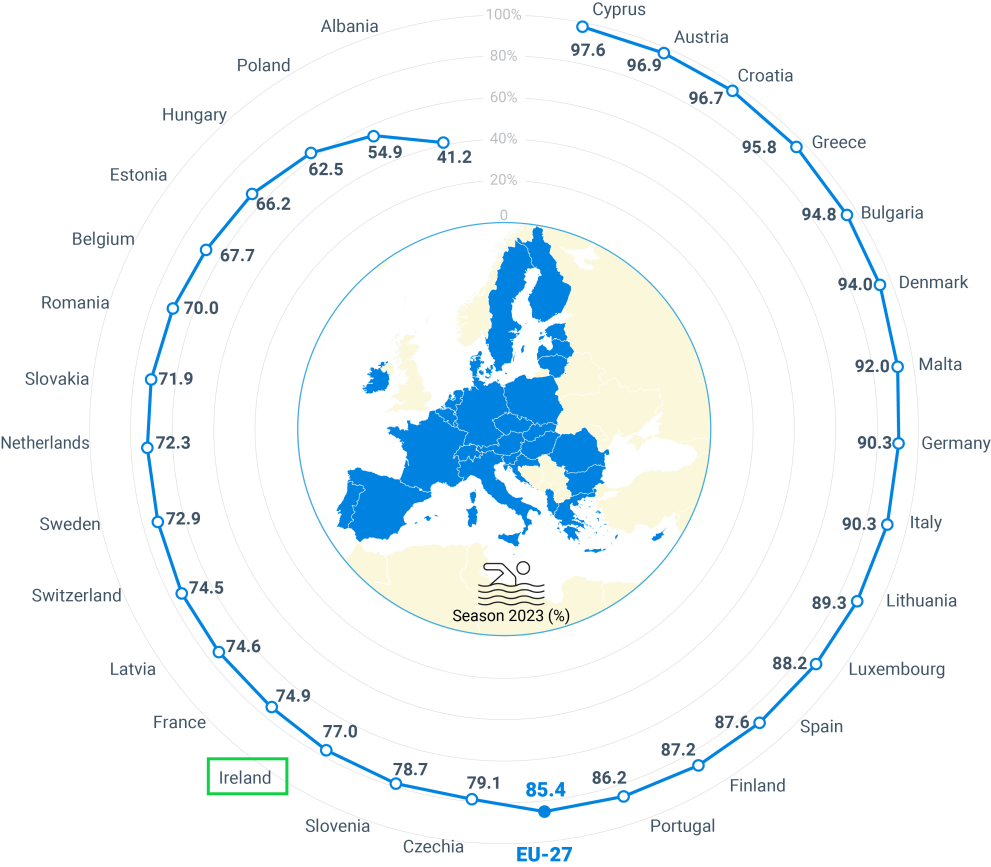
This represents 85.4% of the EU's popular bathing waters. As much as 96% of all officially identified bathing waters in the EU met the minimum quality standards, with only 1.5% rated as ‘poor'.
For Ireland, 77% of the 148 bathing water sites monitored in 2023 were rated as “excellent”, remaining below the EU average of 85.4%, and down from 79.1% in 2022. A further 16.2% of Irish bathing waters were rated as “good”, while 3.4% were classed as “sufficient” and 3.4% “poor” (up from 2% in 2022).
The assessment, put together by the European Environment Agency (EEA) in cooperation with the Commission, highlights where swimmers can find safe bathing sites in Europe this summer. It focuses specifically on safety for bathing, through monitoring of bacteria which can cause serious illness in people, rather than general water quality.
The highest share of excellent bathing waters is found in Greece, Croatia, Cyprus and Austria. In Belgium, Bulgaria, Luxembourg, Malta, Austria and Romania, all officially identified bathing waters met at least the minimum quality standard in 2023.
The bathing quality of coastal water is generally better compared to inland water. In 2023, 89% of coastal bathing sites classified are of excellent quality, compared to just under 79% of inland bathing waters.
Since the adoption of the Bathing Water Directive in 2006, the share of bathing waters with poor water quality has dropped in the past decade and is now stable since 2015. However, health risks from swimming in bathing waters are an ongoing issue with 321 ‘poor' sites in the EU reported in 2023.
Swimming in bathing waters with poor quality is not just a health risk; it also undermines the trust of our citizens. With the vast majority of bathing sites across Europe achieving excellent quality, Europeans can enjoy safe standards for their swimming activities this summer. Building on the EU’s comprehensive water legislation and our zero-pollution ambition, we remain steadfast in our commitment to enhancing water resilience and strive towards securing a constantly higher level of protection. This dedication is vital for both the health of our people and the protection of our environment, ensuring that Europe remains a global leader in water quality and environmental stewardship.
Virginijus Sinkevičius, Commissioner for Environment, Oceans and Fisheries
Background
The assessment for today's report is based on the monitoring of 22,081 bathing sites across Europe that were reported to the EEA for the 2023 season. This includes sites in all EU Member States, Albania and Switzerland. It is based on data reported by Member States for the 2020-2023 bathing seasons.
Alongside this year's Bathing Water Report, the EEA has also released an updated interactive map showing the performance of each bathing site. Updated country reports are also available, as well as more information on the implementation of the directive in countries.
Although most of Europe's bathing waters are in excellent condition from a bacteriological perspective, pollution of surface and groundwaters remains significant and may be exacerbated by the changing climate. Improving water resilience for people and for the environment in coming years will be key.
The Bathing Water Directive, complementing the Water Framework Directive, is one of several pieces of EU law that protect water: the Environmental Quality Standards Directive, the Groundwater Directive, the Nitrates Directive, the Marine Strategy Framework Directive and the Urban Waste Water Treatment Directive.
In the context of the European Green Deal and the Zero Pollution Action Plan, the Commission is assessing whether the Bathing Water Directive remains fit for purpose to protect public health and improve water quality, or if there is a need to improve the existing rules and propose relevant updates, including new parameters to allow better future assessments of bathing water quality.
The report is published during the Commission's annual EU Green Week, including the conference “Towards a water resilient Europe” starting in Brussels on 29 May. At the EU Green Week, the Commission is launching the #WaterWiseEU campaign an awareness-raising campaign on the need to transform the way water is managed, used and valued. This will encourage people to “See Water Differently” and explore solutions to the various water challenges we are facing today.
For More Information
2023 Assessment on Bathing Water Quality, including country fact sheets and interactive map
Details
- Publication date
- 28 May 2024
- Author
- Representation in Ireland
